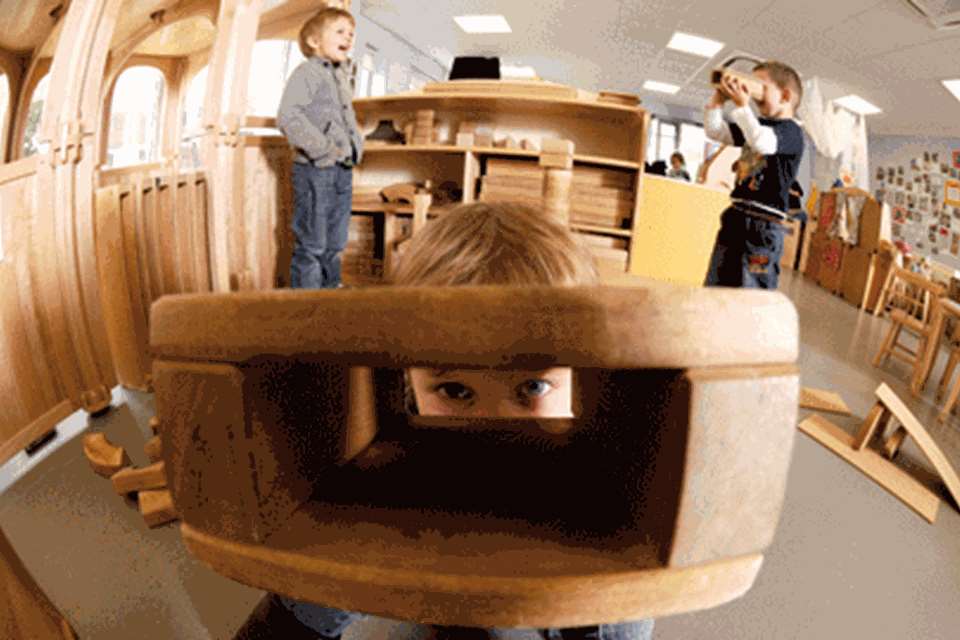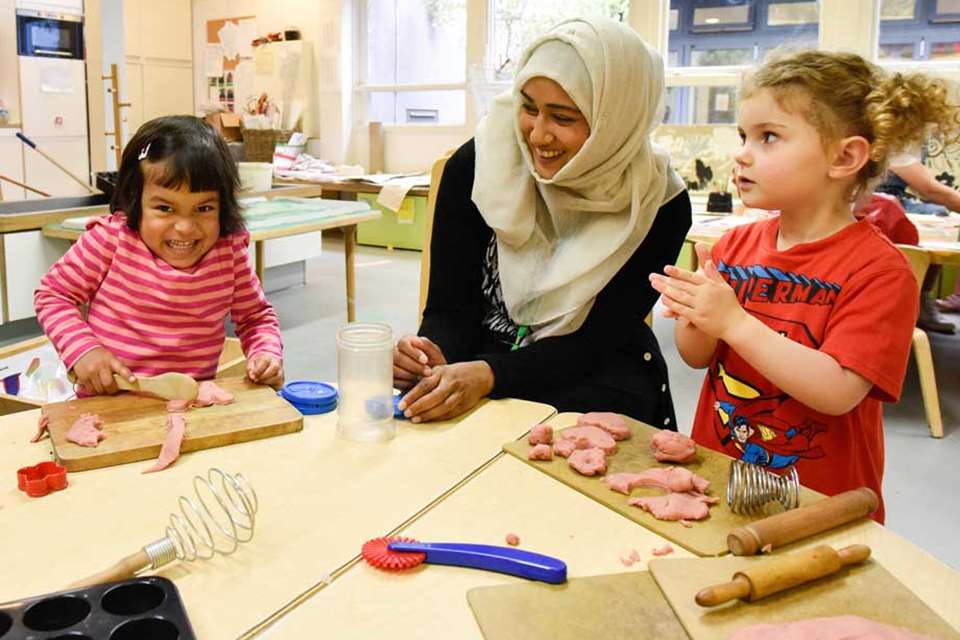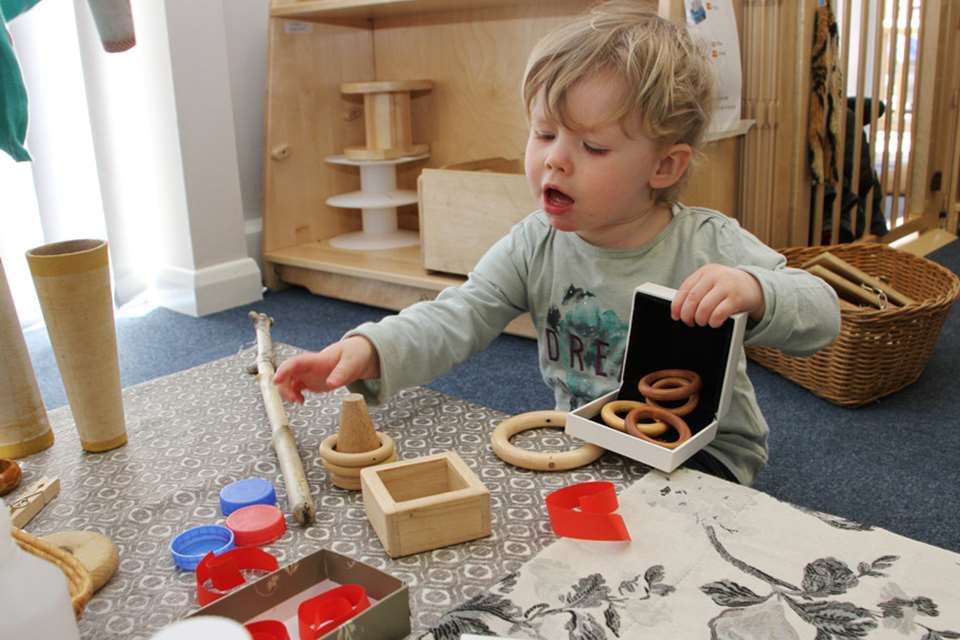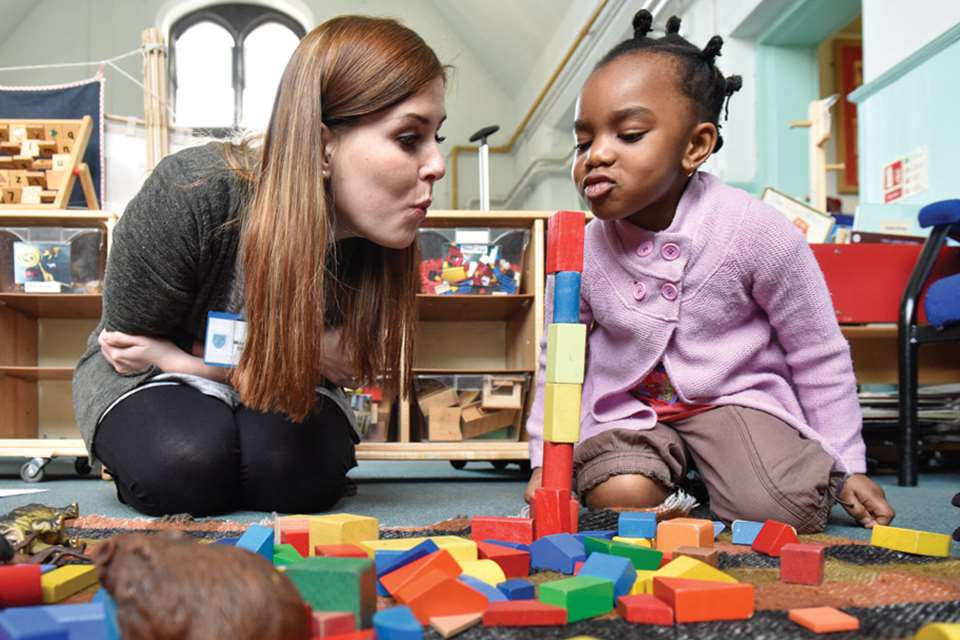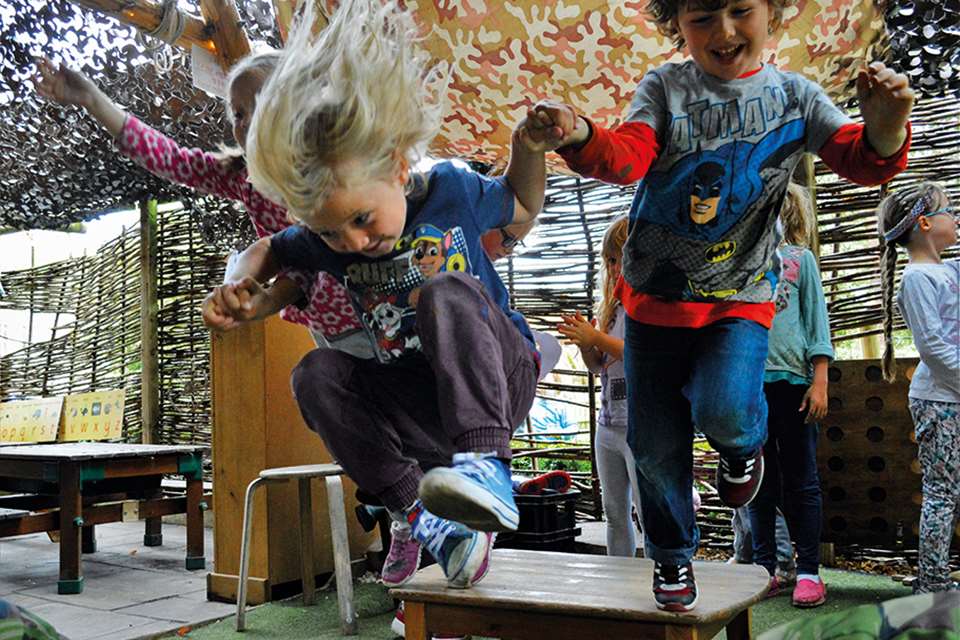EYFS Best Practice - All about…raising quality
Dr Julian Grenier
Monday, October 3, 2016
How a network in a deprived area of London is helping to raise standards. By Dr Julian Grenier
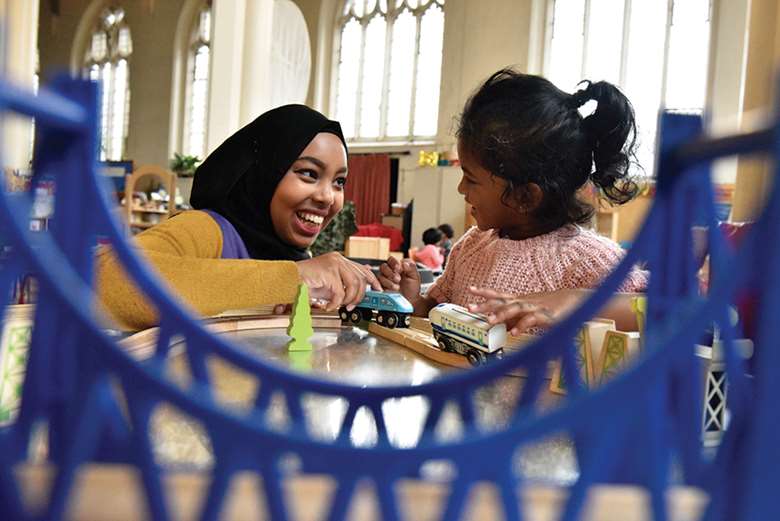
It’s difficult to imagine a conversation about early years education that does not focus on quality, yet there is currently some murkiness about who is taking the lead nowadays. When I first started working in the early years, it was definitely local authorities that were in charge, and quality was mostly about adherence to regulations about ratios, size of rooms, number of toilets and so on. Peter Moss, the distinguished professor in early childhood provision at the UCL Institute of Education, wrote in Nurseries Nowback in 1980 that ‘council nurseries certainly offer good standards of care – most maintain high staff:child ratios and pay a lot of attention to health and hygiene’. Three decades later, owing much to the pioneering work of Professor Moss and others, that sort of wording is unimaginable.
More recently, local authorities and Ofsted have shared the role of maintaining and improving quality in the early years. But early years teams in local authorities have been hit very hard by reductions in funding since 2010, reducing their scope for action, and in 2014 the Department for Education made it clear that Ofsted was now ‘the sole arbiter of quality’ in the early years.
Furthermore, in the past few years the new kids on the block, Teaching Schools, have increasingly focused on early years quality, partly as a result of one-off funding from the DfE. The majority of maintained nursery schools are now either designated as Teaching Schools, or members of a Teaching School Alliance, offering training and other support to early years settings and childminders.
In all, this makes for a patchy and rather fragile system. While Ofsted’s responsibilities are now clear, its role is necessarily limited. Inspection in itself can only check for quality and compliance with the law: the work to improve quality has to happen elsewhere. Some local authorities continue to provide the sort of ongoing support and training that can help providers to improve. However, others have just a skeletal early years team which will work with only a small number of providers, for example those judged to be Inadequate or requiring improvement. There are lots of Teaching Schools in some places, such as London, but there are hardly any in areas such as Yorkshire and The Humber and large parts of the South East. Although it makes sense to argue that developing quality in early years education is a national issue, in reality we have a postcode lottery.
Local authorities are set to have their funding cut even further year on year, so it is very likely that their early years teams will become even smaller and the amount of support and training will diminish, too. So, it is hard to see how the sector can make improvements where they are needed – for example, Ofsted has continually highlighted the fact that children from poorer families achieve significantly worse outcomes by the end of the EYFS. How can settings tackle this equality challenge, without tailored support and training?
This fragility might, it can be argued, undermine new thinking about improving quality in the early years, which puts less emphasis on top-down approaches, and instead prioritises actions at the level of individual settings and schools working in local networks. But if this new approach is to take root and to flourish, it is important that the current arrangements should not be dispensed with too quickly. Teaching Schools are not yet country-wide, and the maintained nursery schools which lead much of the early years work are currently threatened by funding uncertainties.
What we need, I would argue, is enough investment to help the sector through this period. Local authorities should not be put in the position of having to shrink their early years teams; funding for maintained nursery schools should be put on a firm footing; and there should be wider funding beyond the school sector to encourage these new approaches to improving quality. It cannot make sense, surely, that leading nursery organisations and chains – like Bright Horizons and London Early Years Foundation, to name just two – cannot bid for the funding and status that Teaching Schools have.
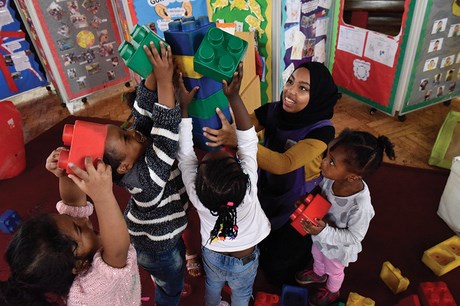
NEWHAM: TOWARDS NEW WAYS OF WORKING
I work in Newham, East London, where we are fortunate that the local authority is forward-looking and is supporting the gradual development of a setting-based approach to quality improvement through networking and joint practice development. So, instead of risking a situation where local authority support might diminish without any alternative being ready to take over, Newham is beginning to support a transition towards new ways of working while keeping its early years team intact.
Back in December 2012, Newham had been declared the worst local authority in England for early years across the early years and education press, because it had fewer settings and childminders rated Good or Outstanding than any other part of the country. For me, working in the area, this naming and shaming felt like a sudden and very heavy fog falling, deadening hope and energy.
Of course, there is an argument to be had about the accuracy of Ofsted’s findings under the previous Early Years Inspection Framework. For example, a 2012 study by the University of Oxford and the Daycare Trust concluded that ‘Ofsted grades, even those awarded for “provision quality”, do not provide a full picture of the quality of settings’ (Mathers et al 2012). But it is also possible to respond to challenges like this without just entering into a war of attrition about the validity of different measures.
In place of despair, could we have a determination to improve conditions and ensure that children and their families have an appropriate experience of early education and care? Galvanised by the challenge, a range of early years leaders across Newham came together to create a project that we called ‘Learning without Limits’.
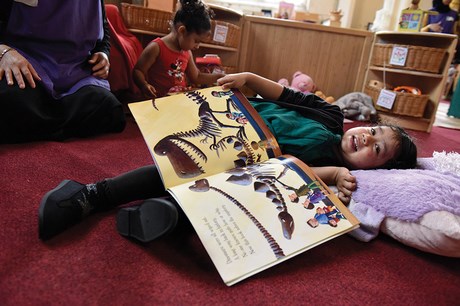
Learning without Limits
We were inspired by the Learning without Limits project led by the Wroxham School in partnership with Cambridge University. Professor Geoff Hayward, from the university, stated that Wroxham was ‘dedicated to developing approaches to teaching and learning that do not rely on determinist beliefs about ability’. In Newham, we were opposed to the ‘determinism’ which argued that of course children in a poor part of East London would have a poorer experience of their early education and care.
Newham is, indeed, a daunting context: with very high levels of child poverty, ill-health and overcrowded housing, it is an area with very high levels of mobility where nearly all children come into their first setting speaking little or no English. But we were determined instead to focus on the potential inherent in a highly diverse, energised population, and the possibilities afforded in a dense urban area for collaboration.
Learning without Limits brought together all of Newham’s nursery school head teachers, supported by money from the local authority’s Education Guarantee budget and working closely with the Early Years Quality Team. We clearly rejected the idea that the nursery schools would ‘disseminate’ good practice to settings, through training or good practice visits. Instead, we understood the work of developing pedagogy and improving quality as a networked activity, not a one-way flow of expertise from one group to another.
One strand of Learning without Limits began with Sheringham Nursery School working with A Plus Education and the early years consultant Judith Stevens to develop a quality improvement project in partnership with all of its local settings and with its network of childminders. 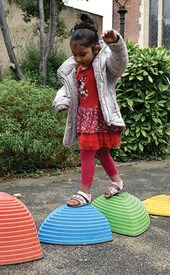
Briefly, A Plus carried out quality audits at Sheringham and in all the local settings, using the ITERS-R (Harms et al 2006) and ECERS-R (Harms et al 2004) scales, which had previously been used in a raft of longitudinal research programmes including the Effective Provision of Pre-School Education (EPPE) Project (Sylva et al2010).
Alongside the use of the quality audits, Ms Stevens provided year-round training focused on children’s early communication, based on the Every Child a Talker programme.
The project was designed so that staff at Sheringham Nursery School participated in the training alongside their colleagues from other local settings: it was a peer-learning programme. All participants were encouraged both to reflect on their practice and also to gather data about their setting. The data was a highly important element: the projects were designed so that participants might be surprised and challenged by data, and were also designed to enable participants to track change and improvements.
At the end of the first year, not only was there very favourable feedback from all the participants: there was also very encouraging data to show that the outcomes for children in the area of their early communication had improved significantly, and the quality scores using the ITERS-R and ECERS-R scales had also improved.
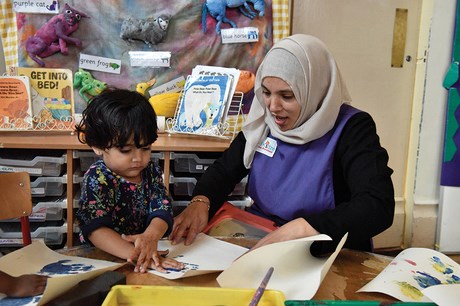
Comprehensive peer-learning network
In the second year of the project, the networked learning model was extended across Newham, with the nursery schools linking up with local PVI settings to work on quality improvement projects based on the year one model. By the end of year two, the Ofsted ratings of the settings around Sheringham Nursery School were now all either Good or Outstanding, and childminder ratings had moved considerably ahead of the Newham average too.
All of the settings involved had improved their ECERS-R and ITERS-R scores to 4 or above: this is significant because the Early Education Pilot for Two Year Old Children(Smith et al 2009) found that it was only where scores were 4 or higher that the children appeared to benefit in terms of their learning and development. Overall, the close work between the settings, childminders, the local authority team and the nursery schools had led to improvements in every sector across the local authority.
By 2015, the new way of working was becoming embedded in Newham. This year, the local authority took the brave decision to merge its early years improvement spending with the Learning without Limits project, to create a comprehensive network across Newham. The ‘peer-learning model’ has been expanded so that every PVI setting is part of a local quality improvement network led by a maintained nursery school. The joint training and quality improvement projects have been expanded with a stronger focus on the inclusion of children with special educational needs and disabilities.
In turn, A Plus Education is now developing a higher-level, quality assurance role and will be supporting Newham with the piloting of a wider range of materials as part of the URLEY (Using Research tools to improve Language in the Early Years) project with the Education Endowment Foundation. This reflects the desire of the Learning without Limits project to develop a range of approaches and measures, rather than relying solely on Ofsted. We are also about to start a partnership with International Early Years on its Born4Life project, based on practitioner-led enquiry.
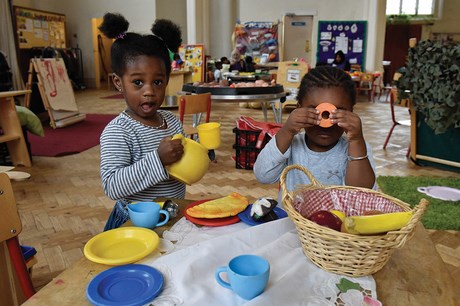
Practitioner-led enquiry and accountability
By supporting individual practitioners in taking control of their professional development, and focusing on improving children’s experiences and their learning, we are continuing to move away from top-down accountability. Instead, we see accountability as arising from the strengths and professionalism of settings, childminders and schools. Within the networks of settings and practitioners, there are accountabilities to each other, to the local system, and pre-eminently to the children and their families.
Increasingly, Ofsted is seen as a means of validation and challenge for our project and its practices, holding us all accountable to parents and the wider public. We see the self-improving early years system as one in which the local authority, schools and early years providers work together for the purposes of:
- increasing teacher/practitioner and school/setting ownership of accountability to support growing practitioner professionalism and to improve children’s learning, health and well-being
- ensuring early years evaluation is a dynamic and inclusive process across sectors and across local neighbourhoods, involving families, staff, school governors and key early years stakeholders in the community – leading to improved quality and improved outcomes for children
- establishing a culture of professional reflection, enquiry and learning within and across schools, settings and the whole early years system that increases practitioners’ aspirations and the development of better practice in early years teaching and children’s learning, health and well-being
- embedding collaboration within and across schools and settings as a rigorous and effective tool for improving practice
- using local networks to develop capacity and ensure wide participation and engagement (adapted fromGilbert 2012).
It’s an exciting vision for the future: but it is vital that the transition towards these new ways of working is not made too quickly. At this time of uncertainty and fragility in the early years system, I would argue that the Department for Education needs to work closely with providers from all sectors and with local authorities to maintain both the levels of confidence and the funding which are needed for successful quality improvement work.

CASE STUDY: KOOL KIDZE NURSERY
Working with Sheringham Nursery School’s Learning without Limits network has been a huge advantage for all of the team at Kool Kidze, say owner and director Sohail Khan (pictured) and manager and director Nurun Begum
‘The training and supportthat we have received has been hugely beneficial to us as a whole setting, especially the managers. The knowledge that we have gained has been disseminated to staff andhas been ingrained in ourdaily routine.
‘By implementing the training into practice we have noticed that we have raised our quality of teaching to a new and higher level, and this has been noted in our recent Ofsted inspection report (January 2016) and by positive parent feedback.
‘Kool Kidze hasmentioned the positive contribution that Sheringham Nursery School has played in raising our standards in our Self-Evaluation Form, which was picked up bythe Ofsted inspectors.’
Every Child a Talker
‘Through ECaT, we are able to identify children with speech and language difficulties by undertaking observations when the child enters the setting and at the end ofthe term. Staff track childrenin three categories, andthis information is then uploaded onto a spreadsheet, where managers analysethe information.
‘Any child who is not meeting the milestone for their age and stage is therefore signposted to services at the local children’s centre. As a setting, we also put an Individual Education Plan in place, which is reviewed with the parents on a termly basis to see if the child has made any progress.
‘In addition to this, Sheringham Nursery School supported us with three visits from a specialist speech therapist who came to the nursery and observedchildren with their parents. Strategies were put in place for children that needed support both in the setting and at home. We have already seen positive improvements in children’s language.’
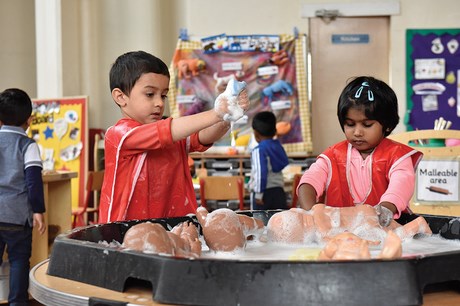
Infant/Toddler Environment Rating Scale (ITERS-R)
‘ITERS-R contains a wide range of statements or “indicators” with which to evaluate the quality of the early years environment in its broadest sense. These stack up like building blocks to celebrate strengths and provide signposts to improvement. They also provide a rigorous means of measuring quality – and improvement in quality – over time.
‘We have had two ITERS audits through the Learning without Limits network, which have made us think about our setting in much more detail. We have found this to be a fantastic self-evaluation tool; it has helped us improve our setting in terms of displaying children’s work, providing communication-friendly spaces, using different construction resources for children of different ages, and having much more focus on two-year-old resources.
‘The impact of these audits has been substantial for us; parents and Ofsted commented on the positive changes to the setting.’
Creative arts workshop
‘The network also offered us workshop training with independent early years consultant Anni McTavish, which has had a tremendous impact in raising children’s creativity in songs and rhythms.
‘We have embedded the songs in our daily routine; dance and movement is very important to develop cognitive skills and gross motor skills – the children really enjoy this part of the session, especially the two-year-olds.’
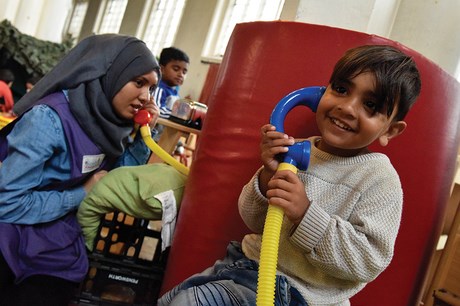
Transition pilot scheme
‘We were also fortunate enough to be involved in a Transition Pilot Scheme, which was led by Sue Gregory, formerly Ofsted’s director of early childhood. The group of settings and schools in the pilot worked together in order to develop a consistent report format for children leaving settings and going into school.
‘The report, which parents contribute to, concisely tells the school about the child, when they started, their interests and their levels of development at the point of transition, and other relevant details. The format we agreed is also easy to send electronically. After a few trial runs this has now been implemented across Newham: we were very proud to be a part of this scheme.’
REFERENCES
- Gilbert C (2012) Towards a self-improving system: the role of accountability in schools, http://bit.ly/2d6ph9M
- Harms T, Clifford RM and Cryer D (2004) Early Childhood Environment Rating Scale – Revised (ECERS-R). Teachers’ College Press
- Harms T, Clifford RM and Cryer D (2006) Infant/Toddler Environment Rating Scale – Revised (ITERS-R). Teachers’ College Press
- Hughes M (1980) Nurseries Now: A fair deal for parents and children. Pelican
- Mathers S, Singler R and Karemaker A (2012) Improving Quality in the Early Years: a comparison of perspectives and measures, http://bit.ly/2d6LPGb
- Smith Ret al (2009)Early Education Pilot for Two Year Old Children: Evaluation, http://dera.ioe.ac.uk/10651/1/DCSF-RR134.pdf
- Sylva Ket al (Eds) (2010) EarlyChildhood Matters: Evidence from the Effective Pre-school and Primary Education Project. Routledge.
- Born4Life, www.ieytoday.co.uk/born-4-life


